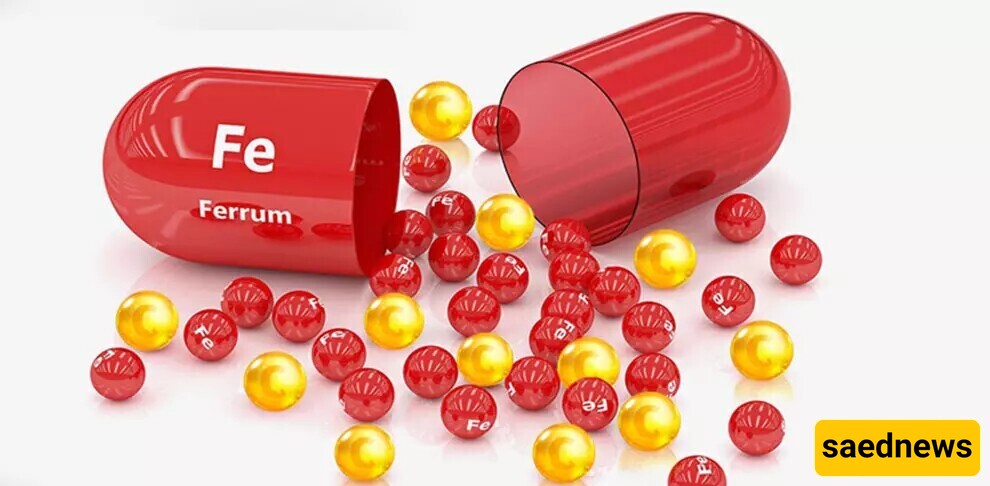Have you ever felt tired and exhausted, even after getting enough sleep? All these could be signs of iron deficiency in your body. Iron deficiency is one of the most common nutritional deficiencies, which, if left untreated, can lead to serious problems such as a weakened immune system, reduced concentration, and even hair loss.

According to the family magazine service of Saed News, have you ever felt tired and exhausted, even after getting enough sleep? Or maybe you've noticed your face looking pale and aren't sure why? These can all be signs of iron deficiency in your body. Iron is a vital element that plays an important role in energy production and oxygen transport to tissues. Iron deficiency is one of the most common nutritional deficiencies, which, if left untreated, can lead to serious problems such as a weakened immune system, reduced concentration, and even hair loss. In this article, we will explore the symptoms and signs of iron deficiency, its consequences, and how to diagnose and treat it.
Symptoms of Iron Deficiency
Iron deficiency is one of the most common nutritional issues globally. If left untreated, it can significantly impact overall health. Here are the complete symptoms and effects of iron deficiency to help you recognize and address them promptly:
Constant Fatigue and Weakness Iron deficiency reduces hemoglobin levels in the blood, the protein responsible for oxygen transport. As a result, oxygen delivery to tissues and organs is less efficient, leading to fatigue, weakness, and reduced energy. People with iron deficiency often feel tired even after sufficient sleep and lose the energy needed for daily activities.
Pale Skin and Mucous Membranes Pale skin is another sign of reduced iron levels. This occurs due to decreased hemoglobin, the component that gives blood its red color. In addition to skin, a paler color in the mouth and gums can also indicate iron deficiency.
Heart Palpitations and Shortness of Breath Iron deficiency causes the heart to work harder to compensate for inadequate oxygen delivery to tissues. This can result in heart palpitations, shortness of breath, and even chest pressure. Individuals with iron deficiency might experience breathlessness during simple activities like climbing stairs.
Headaches and Dizziness Reduced oxygen supply to the brain increases the likelihood of persistent headaches and dizziness, especially during times of increased concentration.
Hair Loss and Brittle Nails Iron deficiency can lead to hair loss and brittle nails. The body prioritizes limited iron for vital organs and functions, reducing the supply to hair and nails. Using iron supplements and hair-strengthening pills containing essential vitamins and minerals can help.
Decreased Appetite or Craving Non-Food Items (Pica) In some individuals, iron deficiency can lead to cravings for non-food items like dirt, ice, or starch, known as pica. This is more common in children and pregnant women.
Cold Hands and Feet Reduced hemoglobin levels limit blood flow to the hands and feet, causing persistent coldness in these areas. If your hands or feet are always cold, it might be a sign of iron deficiency.
Altered Taste and Smell A lesser-known symptom of iron deficiency is altered taste and smell. Iron plays a key role in nerve cell function, and its deficiency can disrupt taste and smell receptors. People with iron deficiency might not taste or smell food as well as before or may notice changes in their sensory perceptions. Zinc supplements can help improve these issues.
Causes of Iron Deficiency
Iron deficiency can result from various factors, generally falling into four main categories: inadequate dietary iron intake, blood loss, absorption issues, and increased bodily demand for iron.
Inadequate Dietary Iron Intake A common cause of iron deficiency is insufficient consumption of iron-rich foods. Diets low in red meat, liver, fish, leafy greens (like spinach), and legumes can deplete iron stores. Vegetarians or those with restrictive diets are at higher risk since plant-based iron sources may not fully meet the body's needs.
Blood Loss Blood loss is a major cause of iron deficiency. This can result from heavy menstrual periods in women, gastrointestinal ulcers, surgeries, or chronic bleeding such as stomach ulcers or colon polyps. Frequent blood donors or individuals with ongoing gastrointestinal bleeding are also at higher risk.


